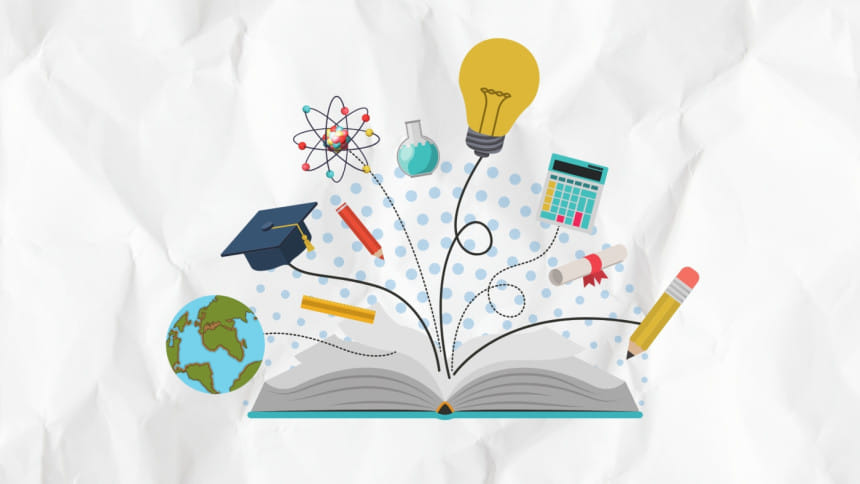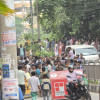The need to transform Bangladesh’s education system

Bangladesh has made commendable progress in areas such as economic growth, healthcare, and infrastructure over the past decade. However, despite being a foundational pillar for sustainable development, our education sector remains far from achieving its desired transformation. A strong, effective, and future-oriented education system is crucial for building an inclusive and resilient nation.
The quality of a country's education system directly influences the strength of its human resources, social equity, and national development. Yet, Bangladesh's current education system is fraught with structural inconsistencies, quality deficiencies, infrastructural limitations, and significant disparities. To overcome these challenges, strategic reforms, visionary leadership, and a collaborative effort from all stakeholders are imperative.
Curriculum modernisation and redefining educational goals
The current curriculum is largely academic and exam-driven, which stifles creativity, analytical thinking, and problem-solving skills. Education should not merely be a tool for securing jobs. It must aim to nurture thoughtful, responsible, and empathetic citizens.
The curriculum must be aligned with modern realities, incorporating critical themes such as climate change, gender equality, digital literacy, social inclusion, and health awareness. A holistic "whole-person education" model – one that nurtures students' social, emotional, physical, and ethical development while encouraging creativity, supporting psychological well-being, inspiring deep inner reflection, and opening doors to new opportunities – is essential for fostering both intellectual and emotional growth.
Enhancing the status and professional development of teachers
No education reform is possible without empowering teachers. In Bangladesh, many educators are undertrained and lack opportunities for professional development.
To attract and retain qualified professionals, teaching must be made a prestigious and rewarding profession, with fair salaries, continuous training, and opportunities for research. Moreover, recruitment must be transparent and free from political influence.
Embracing technology in education
While the world is rapidly advancing in artificial intelligence, machine learning, and automation, Bangladesh's education system is still lagging. A stark digital divide persists between urban and rural areas.
Every school must be equipped with internet access, multimedia classrooms, and digital learning tools. At the same time, both students and teachers should receive training to use these tools effectively. A national open learning platform could further enhance access to quality education.
Expanding technical and vocational education
Technical education remains undervalued in our society, though it is one of the most vital sectors for national progress. With nearly 60 percent of the population under the age of 30, investing in technical and vocational skills can unlock enormous potential in the labour market.
Partnerships between industries and educational institutions must be strengthened, while technical institutions should be upgraded to meet international standards.
Inclusive education for marginalised communities
Education must be inclusive, ensuring no one is left behind due to gender, ethnicity, geography, or disability. Special attention must be given to hill tracts, coastal areas, char regions, and differently-abled children, with tailored curricula, infrastructure, and trained teachers.
Ensuring girls' access to education also requires safe schools, gender-sensitive sanitation, and menstrual hygiene management facilities.
Reforming assessment and evaluation systems
The current GPA-based, rote-memorisation evaluation system creates excessive pressure on students and fails to nurture creativity. Alternative methods such as continuous assessment, open-book exams, project-based learning, and oral presentations should be introduced in line with global best practices.
Assessment should be a tool for growth, not fear or punishment.
Ensuring continuity and political commitment in education policy
While successive governments have introduced various education policies, their implementation and continuity have often been lacking. Education should be treated as a matter of national importance and not as a political priority.
A long-term, non-partisan, and inclusive education policy is essential, with a shared commitment from all political and social actors.
Learning from global models and strengthening international collaboration
Countries like Sri Lanka, Vietnam, and Finland have shown remarkable progress in education through visionary policies and inclusive practices. Bangladesh can adapt such successful strategies to its own context.
Stronger collaboration with international development partners in skill development, research, and teacher training can also catalyse long-term improvements.
Increasing budget allocation and ensuring good governance
Despite its importance, education in Bangladesh receives less than 2 percent of the GDP in budget allocation, which is far below UNESCO's recommended 6 percent. Alongside increasing the budget, there must be stringent accountability in expenditure.
Combating corruption, minimising waste, and ensuring efficiency are essential to bring about meaningful change.
With nearly half the population under 25, Bangladesh stands at a crucial juncture. This large youth population can become either the country's greatest asset or its heaviest burden depending on how they are educated and empowered.
Reforming education is not about rewriting textbooks; it requires a revolution in vision, approach, and execution. It is time for policymakers, educators, parents, students, and civil society to unite around a shared conviction that investing in education is investing in the future of the nation.
Prof. Dr Quazi Taif Sadat is a Director of Bangladesh University.

 For all latest news, follow The Daily Star's Google News channel.
For all latest news, follow The Daily Star's Google News channel. 







Comments